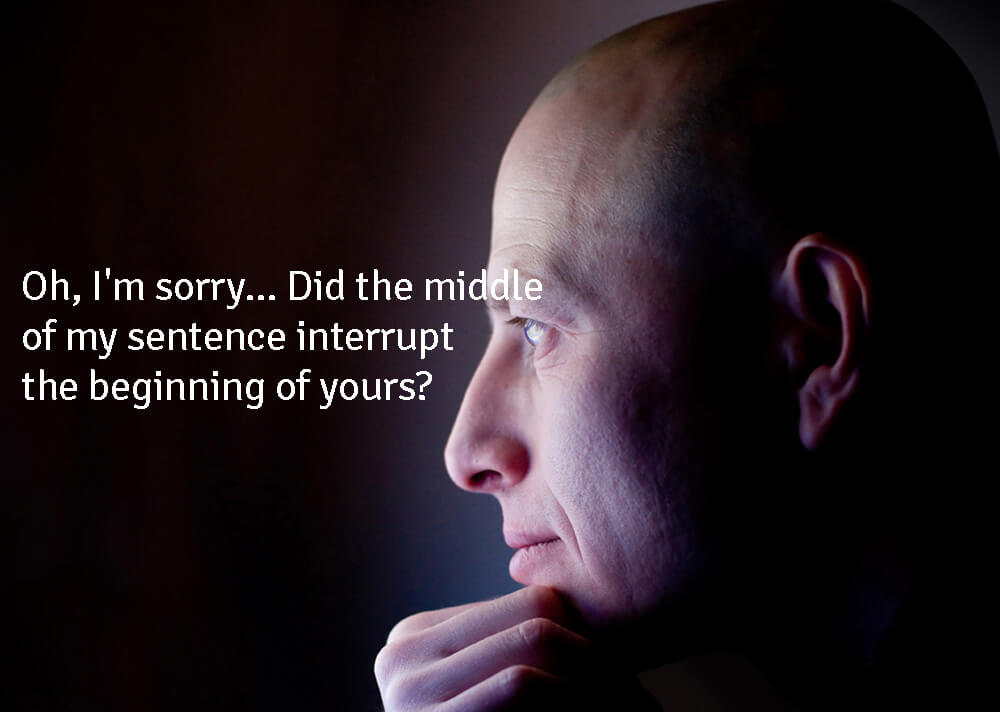Oh, I’m sorry… Did the middle of my sentence interrupt the beginning of yours?
Someone amazing introduced me to that sentence in recent years. Of course I knew what it meant, but I never really gave it any consideration; I dismissed it as though it was not an issue. Interrupting was something I had always done. In my mind I justified the rudeness by thinking I knew what they were going to say anyway.

Interrupting gives the impression that you think you are more important and more interesting than the other person, and that you don’t care what they think. When you consider these implications of interrupting you start to realise how damaging it is. It is rude and arrogant and shows complete contempt for the person you are supposedly listening to.
We all know the importance of listening and have been taught to pay attention from a young age. When speaking to children, it is acceptable to say things like “look at me when I’m talking to you” – but saying that to another adult is difficult and can sound aggressive. So it is almost a gamble as to whether you are being heard or not.
I have changed many things recently, but listening is not one. I couldn’t change how I listened because I never did it; instead I had to learn how to listen from scratch. For many people, having a conversation is often like playing a reverse game of Jenga. They try to slide their opinion in any way they can in any opening, if there isn’t a space they shove their opinion in forcefully, even if it knocks everything else over. Everyone knows the result when this happens, and no-one likes feeling trampled on during a conversation.
I will never be the perfect listener; however, I practice every time I get the chance. Nowadays I find myself enjoying the conversation and actively trying to listen rather than waiting for my turn to speak. As a bonus, the less I say the more intelligent I appear.
Here are my Simple Listening Tips:
- Listen with an open mind: don’t presume anything.
- Stop preparing your reply.
- Avoid distraction. Focus on the speaker. Pause or mute the TV/radio.
- Face the speaker and give subtle hints you are listening; e.g. nodding.
- Try to feel how they felt at the time, if they are relating a story.
- Never interrupt. Give them a chance to finish.
- A pause doesn’t mean it’s your turn, sometimes people just need to collect their thoughts and are intending to continue.
- Don’t judge or patronise.
- Avoid offering advice unless it is asked for. Most people already know what you are going to tell them.
- Be honest. If you believe it is idle gossip or something you really don’t want to hear, tell them respectfully.
- If it is something you strongly disagree with, or they are attacking you let them finish. They will feel you have listened, and then what you do with it is up to you. You are unlikely to change their opinion by talking, arguing or shouting over them.
- Finally, engage yourself by asking questions or confirming part of the story.
- Remember your body language.
- Relax and open your arms as it will show openness. Also, emotional contagion means they will take on your posture and body language: the more relaxed you are the more they will be.
- Don’t lean in, especially with your forehead. This is what people do when they are about to confront somebody.
- Make eye contact. Obviously depending on the relationship you don’t want to make them feel uncomfortable by staring, but eye contact shows you are present and not daydreaming.
Now that I’ve said this, during every conversation I have in future I will be scrutinised to see whether I am listening. That’s fine; please remind me when I stop listening. Learning to really listen is a skill that takes time. It is one of the best skills you can have, and we all have the ability to learn to listen properly.
“When people talk, listen completely. Most people never listen.” – Ernest Hemingway


3 Responses
I appreciate this article. I think I’m an excellent listener — it’s most frequently the only part I play in a “conversation”. And, I’ve definitely noticed that, when I am the speaker, I’m interrupted — and I haven’t liked it. It makes me not want to speak, and not want to spend time with the interruptive person. From your article, I gather it’s a common of habit of people, rather than a personal affront. Good to know. Thanks.
Great article, but easier said than done! I study business communication and this topic is not frequently discussed! It can make or break a deal! The problem is based on certain principles of listening, the more experienced listener that has a greater cognotive response such as a musician will have a competitive edge than someone who has an artistic background! Therefore, it should not be shamed based on the fact of that matter! In the end, it all depends on what level of respect the listener has with the speaker, if its your boss or future investor, listen, if its your friend then it should not matter!
Thank you for the comment. Absolutely. It’s amazing how much difference learning to listen properly will make to your life. You make a brilliant example of music, the ability to hear beyond the notes you already know gives you a depth to what is being heard. This depth is needed whether it is a conversation and a business deal or just understanding nature.